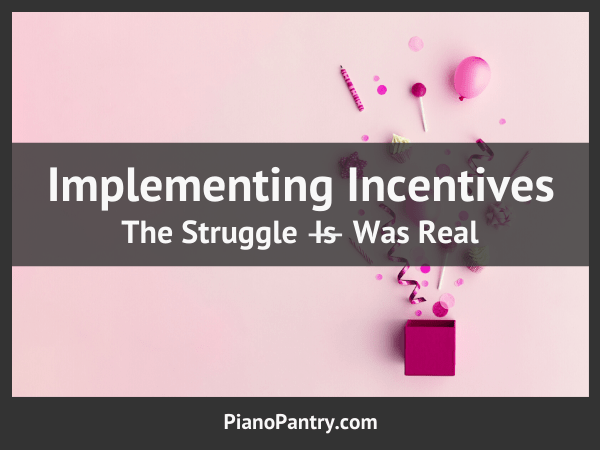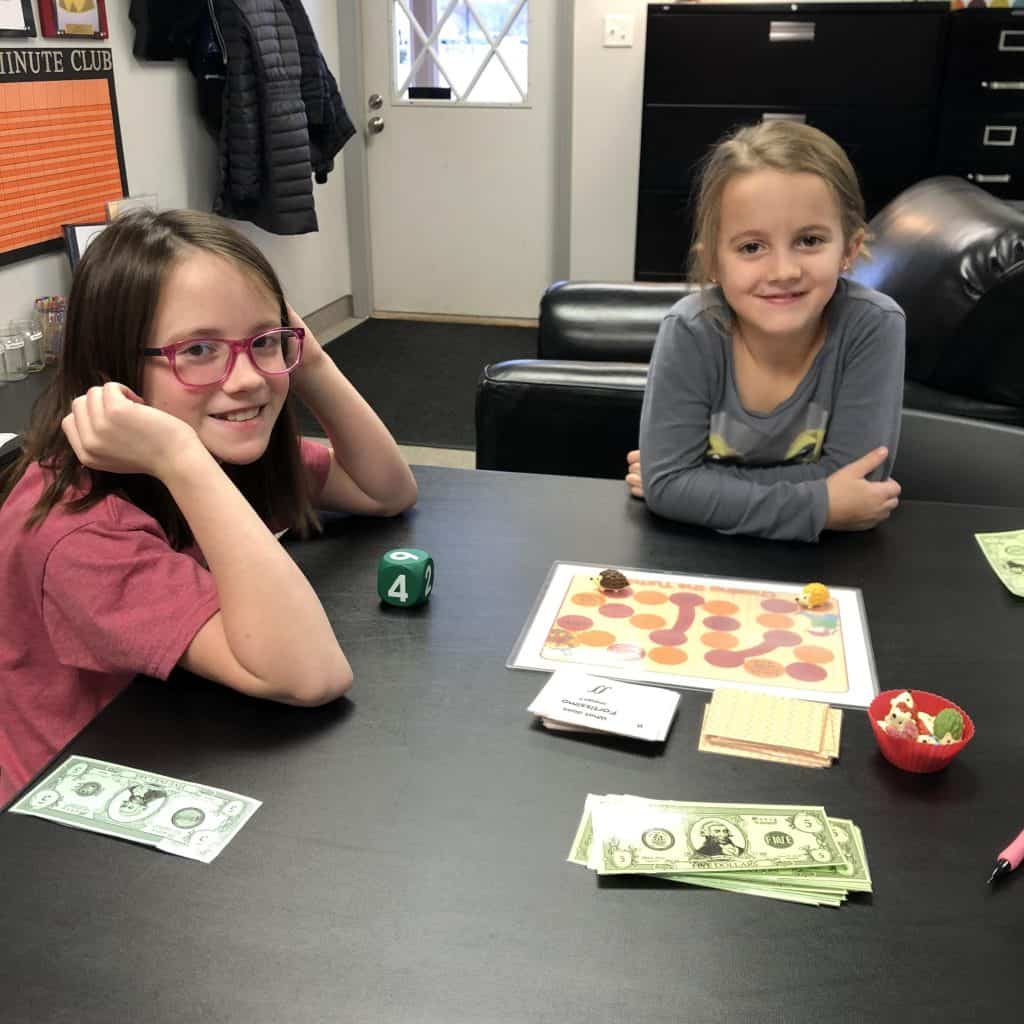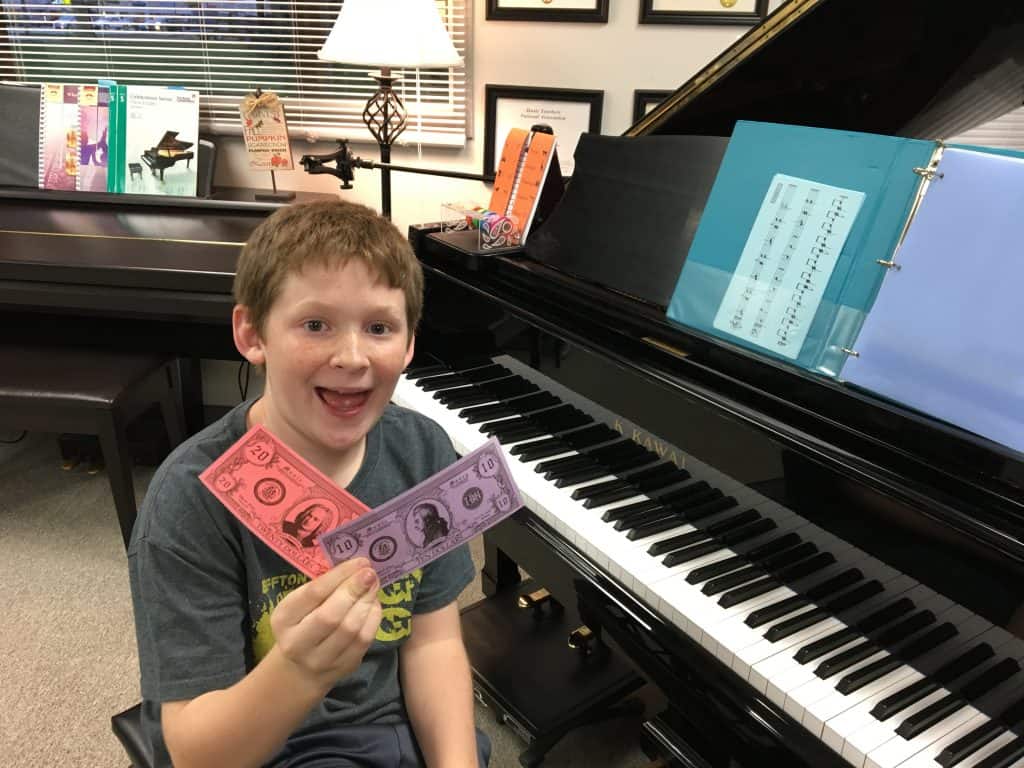
To incentivize or not to incentivize. That is the question.
(Or maybe you’re simply wondering at the moment whether or not “incentivize” is actually a word? It is, by the way. 🙂 )
Do you struggle with implementing an incentive program?
Is it because you’re torn between the philosophy of extrinsic versus intrinsic motivation, or is it because it’s a struggle to be consistent in implementing something? (Or maybe a little of both?)
While plenty of research supports both sides of this age-old question of extrinsic versus intrinsic motivation, today I’ll be sharing my journey with (and support of) implementing incentives. Specifically:
- Why I struggled for years with implementing incentive programs.
- Four things I found an incentive program (and I) needed for long-term success.
- How others in the field helped inspire and develop my own philosophy regarding extrinsic rewards along the way.
- How short-term rewards can turn into long-term joy, including a specific example from my studio.
In a later post, I’ll describe the incentive program I’ve been using successfully for several years and provide a list of popular prize box items.
Incentive Struggles – Trial and Error
When I first started teaching, I struggled for several years with implementing incentives. I experimented with two different types:
- Using a different incentive program each year.
- Not doing a year-long one, but randomly doing several different shorter ones throughout the year focused on specific goals.
Neither of these worked for me. Why?
The problem was pretty simple—it just seemed like implementing a new program every year, let alone several times throughout the year, required too much brainpower.
While I love these ideas, and many teachers do both successfully (I applaud you!), it drained me mentally. Even trying to use plans that others came up with got old after a while.
While I enjoy trying new things frequently in my studio, in some areas I prefer (and need) simplicity.
If I was going to use incentives it needed to be:
- Simple
- Flexible
- Consistent
- Easy to implement
- Works for all ages
Yes, for all ages. Granted, most older students could care less to participate, but using sticker charts and penny jars would most certainly deter them from even if they did want to participate.
Finding Inspiration (and Confirmation)

Thanks to others online who generously share their thoughts and experiences with teaching, I was able to pinpoint my troubles, nail down my philosophy on incentives, and never look back.
Joy Morin made me realize the benefit of sticking to one program. Here is a quote from her post.
“Growing up, I recall my piano teacher implementing a number of different programs while I was taking lessons — unfortunately, she never stuck with one long enough for me to earn a prize very often.”
Julie Knerr confirmed for me that extrinsic motivators (especially for young students) were not going to ruin my student’s intrinsic motivation. (From mini-essay #2: Should Piano Study Be Fun, and are Sticker Charts Bad?)
“I found that in practice with real live children, motivation does not generally work in practice like it should in theory. My students do not always want to put in the daily hard work necessary to set the Work-Joy Cycle in motion, especially if the parent is not devoted to guiding the child’s practice on a daily basis.
Rare is the child that will put in the daily ten years of practice required to become a good pianist solely because of the intrinsic joy that comes from music making. Just as adults generally work harder at their jobs when they receive a paycheck, I believe that rewarding children for their work at the piano will encourage them to keep working over the long term. After all, we would never say that an adult should not get a paycheck because it might destroy his intrinsic interest in his work.”
Short-Term Rewards into Long-Term Joy

When students register for lessons, my favorite question to ask parents is:
To help me be a better teacher to your child, please provide a brief description, including temperament, learning style, what motivates him/her, anything that might cause them to “shut down,” and any other information that would help me get to know and work with your child better.
With younger students especially, I frequently see statements such as:
“She loves rewards, even if it’s just a sticker.”
“He is motivated by candy.”
“Motivated by incentives.”
OK, so yes, real-life children are motivated by small and (seemingly) insignificant things like this!
That being said (and I could be wrong), my experience has shown that even though young students are motivated by extrinsic things, they’re not always necessarily using it as their reason to do the work. I feel like my students view it as more of a fun little reward rather than a motivational tool.
Not: “I have to learn this piece so I can get a prize!”
But: “Oooh!! I mastered this piece and now I get a prize!”
Do you agree or disagree? I’m curious about your thoughts on this!
Extrinsic Becomes Intrinsic

Yes, intrinsic motivation comes from the music, but it takes a lot of details and hard work that isn’t always “fun” to get there. Extrinsic motivators can help along with some of those more tedious parts of piano practice.
A couple of years ago, one of my boys who has been with me now for seven years, made a comment during his evaluation time at the end of the year that he realized that he was continuing to take piano lessons simply because he enjoyed it.
He was no longer taking lessons because it was an activity to do, or because he earned stickers and rewards, or because his parents made him, but he was now intrinsically motivated by the joy he receives in learning and playing the piano.
Yea!
Stay tuned!
In my next post, I’ll share the incentive program I’ve been using with success for several years that has met the requirements of:
- Simple
- Flexible
- Consistent
- Easy to implement
- Works for all ages
Not only that, but it also gives students experience with life skills. BONUS!
Can you guess what it is?
Plus, I’ll share a huge list of prize box items students love.
What have your experiences been with implementing an incentive program? Let’s continue the conversation in the comments!


I’m looking forward to reading more on this! I am one of those teachers who doesn’t use an incentive program, for similar reasons to the ones you listed…I’m concerned about intrinsic/extrinsic motivation, I have a wide range of ages, and most of the ones I see just require too much mental energy on my part. I’d rather spend my energy planning interesting lessons, choosing appropriate repertoire, etc. But I’m definitely open to new ideas! Looking forward to future posts!
Great! Yeah, I started the second pots then all of this COVID-19 stuff happened and it’s gotten put on the backburner. This month though I hope to finish it up!